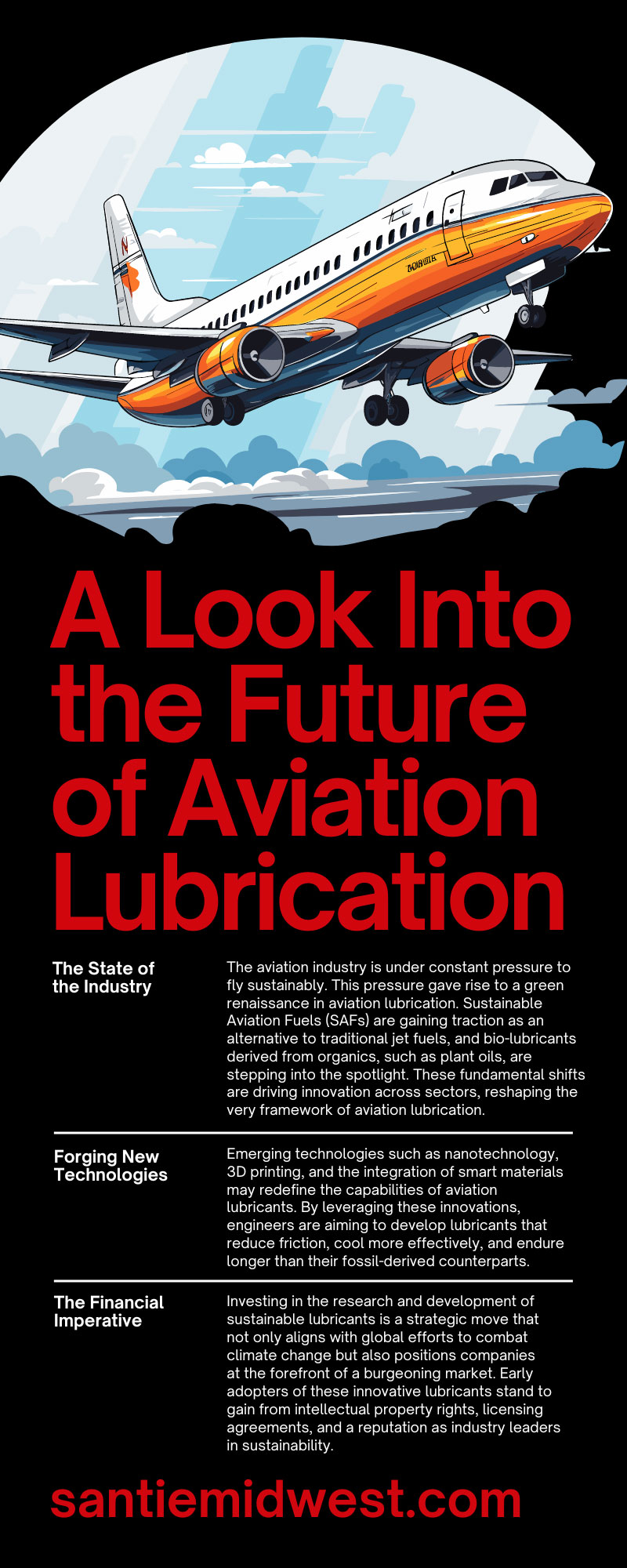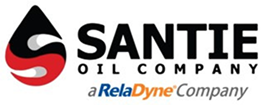The aviation industry stands on the brink of a lubrication revolution. The oils and greases that keep aircraft engines purring are about to undergo an almost seismic shift.
This change, propelled by technological innovations, environmental imperatives, and business needs, heralds a pioneering era in the history of flight. Here, we’ll take a look into the future of aviation lubrication, offering key insights and considerations for the industry at large.
An Aircraft’s Lifeblood
Much like blood coursing through the veins of a living being, lubricants are the lifeblood of an aircraft, vital to every movement and operation that it performs. They ensure that the engine can fulfill its critical function safely and effectively, time after time. However, as the skies become more crowded and the call for sustainability grows louder, the industry must reevaluate how they source and manufacture these products.
Aviation Lubricants Through History
Aviation’s reliance on lubricants is as old as the industry itself, with the Wright brothers and their contemporaries introducing some of the earliest forms of aviation oils. Over the years, as engine design grew more complex, so too did the lubricants that sustained them. This evolution wasn’t merely one of necessity but also one of scientific advancement, with each era in aviation history marking a step forward in lubricant technology.
Compounded by the turbulence of world wars and the thrust of the space race, these oils and greases were forged in a crucible of need and opportunity. The resulting lubricants could withstand the extreme conditions of flight. And yet, for all the distance these oils carried us, their formulas remained rooted in the carbon-rich, fume-belching oils of yesteryear.
The State of the Industry
In our current era, aviation stands at a crossroads. The very act of flight, once marveled at for its miraculous defiance of gravity, now finds itself weighed down by the ecological footprint of its operations. Current jet engines consume lubricants derived from petroleum—a finite resource synonymous with environmental concerns and geopolitical tensions.
The aviation industry is under constant pressure to fly sustainably. This pressure gave rise to a green renaissance in aviation lubrication. Sustainable Aviation Fuels (SAFs) are gaining traction as an alternative to traditional jet fuels, and bio-lubricants derived from organics, such as plant oils, are stepping into the spotlight. These fundamental shifts are driving innovation across sectors, reshaping the very framework of aviation lubrication.
Forging New Technologies
Emerging technologies such as nanotechnology, 3D printing, and the integration of smart materials may redefine the capabilities of aviation lubricants. By leveraging these innovations, engineers are aiming to develop lubricants that reduce friction, cool more effectively, and endure longer than their fossil-derived counterparts.
The use of nanometric particles in lubricants, for example, can lead to significant performance enhancements. These particles, when introduced into the lubricant, create a wear-resistant layer on surfaces, providing a level of engine protection previously unattainable. Similarly, 3D printing enables the formation of complex lubrication pathways directly within engine parts, a degree of intricacy that traditional methods could only dream of achieving.
Corporate-Led Policies
Corporate-led policies in the realm of sustainable aviation lubrication offer a myriad of benefits that extend beyond the immediate environmental impact. In an era where sustainability is increasingly influencing consumer choices, companies that are proactive in their efforts to reduce carbon emissions stand to gain a competitive advantage.
Green Supply-Chains
Global lubrication producers and suppliers have not stood idle in the face of the industry’s push toward sustainability. Recognizing the pivotal role lubricants play in the global endeavor for a cleaner planet, companies have embarked on a series of green initiatives designed to redefine industrial lubrication. Today’s Castrol industrial oil distributors are the perfect place to find sustainable lubricants that meet the demands of your business.
The Sustainable Skies Initiative
The Sustainable Skies Initiative (SSI) is a collaborative effort between aerospace companies, oil producers, and sustainability experts. SSI’s goal is to develop a new class of lubricants that are both high-performing and sustainable. The initiative reflects a broader industry trend toward sustainability, where companies are recognizing profitability in aligning with environmental norms. SSI’s efforts led to breakthroughs in lubrication technology that could potentially slash carbon emissions from aviation, setting lofty benchmarks for sustainability.
Public-Private Partnerships
It’s hard to overstate the emphasis on public/private partnerships in achieving these goals. By forging strong collaborations between government bodies, private industry, and non-profit organizations, the path to sustainable aviation lubrication becomes more attainable. These partnerships are vital in pooling resources, knowledge, and technology to overcome the challenges of creating eco-friendly lubricants that meet the rigorous demands of aviation.
The Financial Imperative
The push for sustainability is not solely motivated by environmental altruism. There’s a clear business case as well. Fuel and lubricants are one of the largest operational expenses for airlines, and any reduction in consumption or increase in efficiency can translate to significant cost savings. Beyond the bottom line, companies that get ahead of the sustainability curve can enjoy a competitive advantage and improved brand appeal.
Investing in the research and development of sustainable lubricants is a strategic move that not only aligns with global efforts to combat climate change but also positions companies at the forefront of a burgeoning market. Early adopters of these innovative lubricants stand to gain from intellectual property rights, licensing agreements, and a reputation as industry leaders in sustainability.
The Holistic Impact
The shift toward sustainable lubricants is reshaping the industry, creating an emerging culture that values stewardship and forward-thinking. By championing sustainable practices in aviation, we set in motion a ripple effect that touches on aircraft design, manufacturing, operations, and the very fabric of our transportation infrastructure.
Sustainable aviation lubricants are emblematic of an industry in metamorphosis, one that grapples with its environmental responsibility while striving for unsurpassed performance. This evolution will redefine how aircraft engines are lubricated and how we perceive air travel. It heralds the transition from a necessity to a privilege, carefully and elegantly executed.
Meeting the Call to the Skies
Sustainable aviation lubrication represents a monumental opportunity for the aviation industry to rise to the challenge of our generation. By harnessing the synergies of advanced technology, environmental consciousness, and economic foresight, we can chart a new trajectory for aviation—one that soars higher than we could have imagined.
The future of aviation lubrication is bright, and even a small look at the industry speaks volumes about the trend. This isn’t just about the future of aviation. It’s about the future of our planet.


